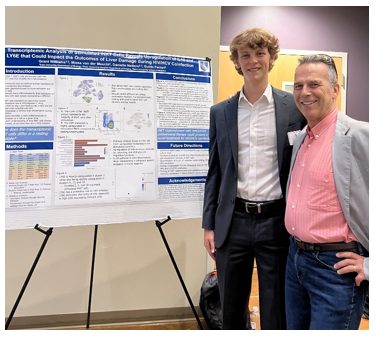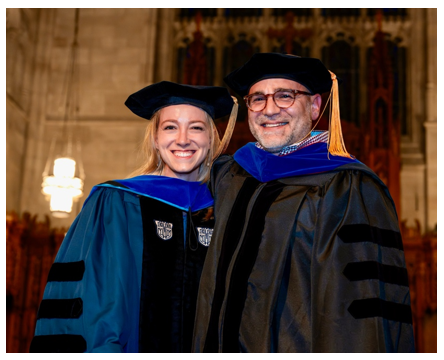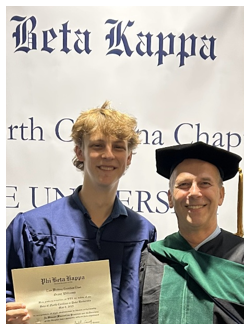This graduation season, the Duke CFAR celebrates two outstanding scholars whose paths have been shaped and connected through the Advanced Immunotechnology (AIT) Core. Grant Williams, a Duke undergraduate who graduated with distinction, and Danielle Nettere, a trainee who graduated with her MD/PhD degrees, are at different stages in their careers but both embody the spirit of scientific curiosity, dedication, and mentorship that the AIT Core has cultivated across generations. These are just two of the many stories from trainees who have benefited from their interactions with AIT investigators and their teams, helping to shape future generations of scientists.
Grant Williams completed an independent research project in the lab of Dr. Guido Ferrari (Professor in Surgery), working closely under the mentorship of Postdoctoral Associate Dr. Mieke van der Mescht and the newly-minted Dr. Nettere. His research focused on invariant natural killer T (iNKT) cells in the context of HIV and Hepatitis C coinfection, a collaboration that included colleagues from Dr. Susanna Naggie’s lab. His contributions helped finalize a manuscript now accepted in Frontiers in Immunology, earning him co-authorship.

Grant contributed to a spin-off project analyzing the single-cell transcriptomic profiles of iNKT cells from people living without HIV. With support from the AIT Core, he conducted experiments, presented original findings at an evening for Biology students graduating with distinction, and authored a senior thesis. He was also inducted into the North Carolina chapter of Phi Beta Kappa.
“The opportunity to work under Dr. Ferrari and be mentored by both Dr. Danielle Nettere and Dr. Mieke van der Mescht has been the most educational and interesting experience of my Duke career,” said Grant. “I cannot express my gratitude enough for the constant support from each of them and from the CFAR AIT Core for affording me this opportunity. Our work on iNKT cells allowed me to expand my knowledge on immunology greatly and exposed me to many important experimental techniques, including cell culture, flow cytometry, scRNA sequencing, and more.”
For Danielle Nettere, Grant’s success marked a milestone in her own development as a scientist and mentor. “Over the last 3 years I have had the pleasure of supervising a talented undergraduate student, Grant Williams,” she reflected. “Not only did we answer some very important questions about the role of HIV and HCV coinfection on rare T cell phenotypes, but I had the unique opportunity to learn how to mentor and supervise an eager and bright young student.”
Danielle’s mentoring role in Grant’s work is a continuation of a multi-generational mentorship lineage fostered by the AIT Core: from Dr. Kent Weinhold (former CFAR Director), to Dr. Ferrari, to Dr. Justin Pollara (Associate Professor in Surgery), to Drs. Van der Mescht and Nettere, and now to Grant. Each generation has been supported by the Core not only in mastering cutting-edge immunological techniques, but in growing as mentors.

“Working together and under the guidance of Guido Ferrari, I developed my skills in teaching and mentorship and helped my mentee learn valuable scientific skills as well as develop ownership over his own project. I am proud to reflect on his accomplishments and humbled for the small role I was fortunate to play in them thanks to the CFAR AIT Core,” Dr. Nettere continued. Her successful journey as an MD/PhD has been deeply influenced by co-mentorship and ongoing collaboration with Dr. Pollara, with whom she has already co-authored two manuscripts—and more are currently in progress.
The AIT Core has long played a pivotal role in nurturing the next generation of HIV researchers and physician-scientists. “[The AIT Core] provided us with the funding and support necessary to complete the single-cell transcriptomics research that formed part of Grant’s thesis. With the Core’s support we were able to analyze a rare subset of cells, offering insights that could lead to even greater discoveries in the future,” said Dr. Mieke van der Mescht. “[Grant’s] dedication and hard work have culminated in his graduation with distinction, an achievement that reflects both his intellect and perseverance. I would also like to express my gratitude to the CFAR AIT Core, which played a crucial role in my growth as a mentor.”

As Grant embarks on a gap year to further strengthen his clinical experience, he joins a growing community of Ferrari Lab alumni—now physicians and medical students—whose careers were launched in part by CFAR support. For Dr. Ferrari, it’s a point of pride that twelve of his former trainees are now either practicing MDs or in medical school. He has shared this experienced with Dr. Pollara, who initially served as a laboratory manager for Dr. Ferrari before pursuing a PhD. Dr. Pollara’s time working with and learning from Dr. Ferrari was his primary motivation for returning to Duke for his postdoctoral training, and to ultimately become a member of the faculty. His return brought significant scientific and mentoring value to both the AIT and the Development cores. Dr. Nettere represents the first trainee to graduate under Dr. Pollara’s mentorship, and he hopes to follow in the footsteps of his own mentor, Dr. Ferrari, by guiding many more. Grant summed up the impact of his time at Duke: “I will take the many lessons I learned in the Ferrari Lab into my future as a physician and researcher, and I thank each of my mentors and the support of the Core for this incredible experience.”